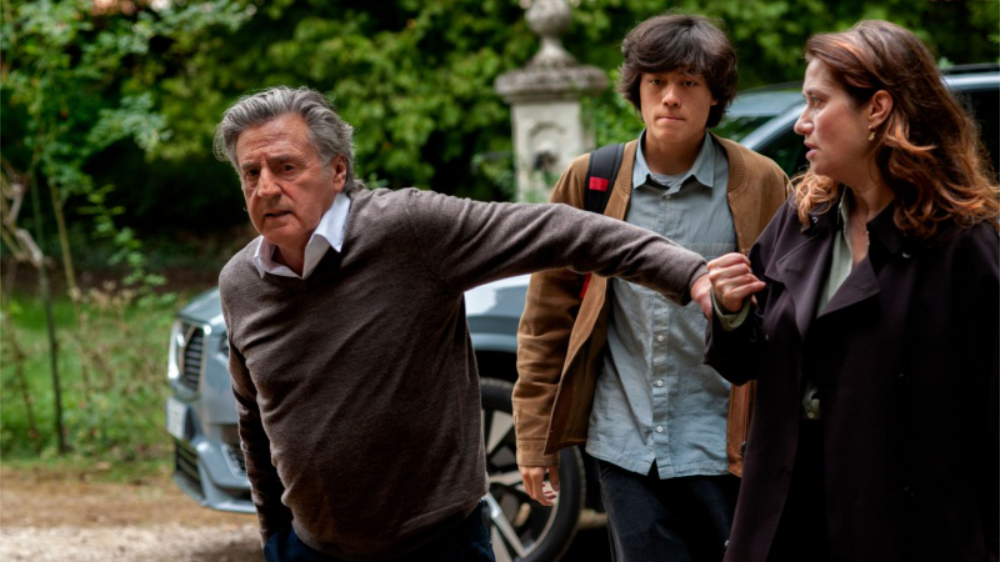
In his staggering 2012 film “Our Children,” Belgian writer-director Joachim Lafosse turned an unthinkable true-life tragedy — the story of a mentally ailing mother who, one hitherto ordinary afternoon, single-handedly murdered all five of her children — into deeply compassionate drama, focusing not on the lurid whats of the event, but its more intimate, less discussed whys. That approach again serves Lafosse well in “A Silence,” another solemn, upsetting domestic chamber piece that lightly fictionalizes and foregrounds the hidden, knotty familial tensions behind a headline-making scandal. In this instance, it’s one disturbing, high-profile court case that begets another, both connected by differing forms of patriarchal abuse — but Lafosse’s interests lie, as ever, less in procedural formalities than in unruly household turmoil.
Outside Belgium, audiences are less likely to be familiar with the case of serial killer Marc Dutroux, convicted in 2004 of the kidnapping, rape and murder of multiple girls — or that of Victor Hissel, a lawyer for two of Dutroux’s victims, who was later imprisoned for possession of child pornography. Changing the names of all concerned but otherwise hewing recognizably close to the facts, “A Silence” is likely to play very differently for those acquainted with these news stories than it will for the uninformed. Which isn’t to say the film works against viewers in the latter camp: Various structural intricacies and dramatic concealments frame it as a mystery, with considerable intrigue in the secrets and complicit silences of one tortured bourgeois family. That suspense factor will fuel distributor interest in Lafosse’s latest following its competition premiere in San Sebastián.
Those already in the know, meanwhile, may be drawn into the drama by the considerable intensity of the performances — in particular from stalwarts Daniel Auteuil and Emmanuelle Devos, as a well-to-do couple whose tense marital front for years of compacted betrayal and denial can no longer hold. Visible only as a pair of devastated, bloodshot eyes in a rearview mirror, Devos gets a stunner of a sustained opening shot, as her character Astrid Schaar drives in a stricken panic to the police station — where she’s told that her teenage son Raphael (Matthieu Galoux) has been charged with attempted murder.
Cue an extended flashback to, well, not happier times but slightly less outwardly Greek-tragic ones. Together with Raphael, Astrid and her high-profile lawyer husband François (Auteuil) share a life of brittle privilege in a palatial walled estate, the vastness of which — with its tennis court and swimming pool and hall-like rooms — enables them to keep each other at a frosty distance. Still, their peace is persistently disrupted by the reporters and cameramen who have hovered outside their home for as long as François has represented the parents of young murder victims in a stretched-out trial of the century, plainly modelled on the Dutroux case.
The grim demands of François’s job do nothing to lighten an already heavy mood at home, where assorted skeletons have shared generous closet space with the Schaars’ designer threads for most of their 30-year-plus marriage. Their adult daughter Caroline (Louise Chevillotte) is aware of unsavory allegations against François from another family member, while her younger brother has been kept in the dark — but with said relative threatening to speak out, and the authorities growingly interested in the contents of François’s hard drive, Raphael can’t remain innocent much longer.
A terse, snaking screenplay — chiefly by Lafosse and regular creative partner Thomas Van Zuylen, but with separate credits for a further five collaborating writers — is perhaps more elliptical than it needs to be in unpacking all this baggage. Certainly, the film’s first half-hour keeps our emotional investment at bay as we work out the precise geometry of the characters and their unhappy histories. But there is a gasping power to its staggered reveals, and a searching sadness to the emerging family portrait that outweighs the film’s shock factor.
Auteuil, increasingly drawn and gray as François’s cover unravels, portrays a potential monster with guarded control; with each ugly detail revealed about him, he retreats further from view. It’s Astrid’s conscience that the film lays bare, and Devos plays her in a state of frenzied stillness: a woman doing her utmost on the outside to shore up a nervous collapse. The guiding perspective, as well as the greatest dramatic burden, in the film’s latter stages is ultimately passed to brooding newcomer Galoux, tersely affecting as an already wary, lonely kid shedding his last vestiges of trust in family.
Yet while “A Silence” is a hothouse actors’ piece, the effectiveness of its horrifying climax rests at least as much on the precise discipline of Lafosse’s filmmaking — here heavier on long-shadowed atmosphere than is usual for him, but not indulgently so. DP Jean-François Hensgens strategically navigates the Schaar household’s luxuriously empty spaces and pools of darkness in ways that alternately trap and cloak its inhabitants, sometimes leaving the viewer anxiously waiting outside the area of conflict. A score assembled from pieces by multiple modern composers — including the late Jóhann Jóhannsson and Ólafur Arnalds, a collaborator on Lafosse’s 2021 feature “The Restless” — is remarkably consistent in its swarming sense of despair, aurally imposing in a way that draws attention to the film dreadful air of domestic hush.













